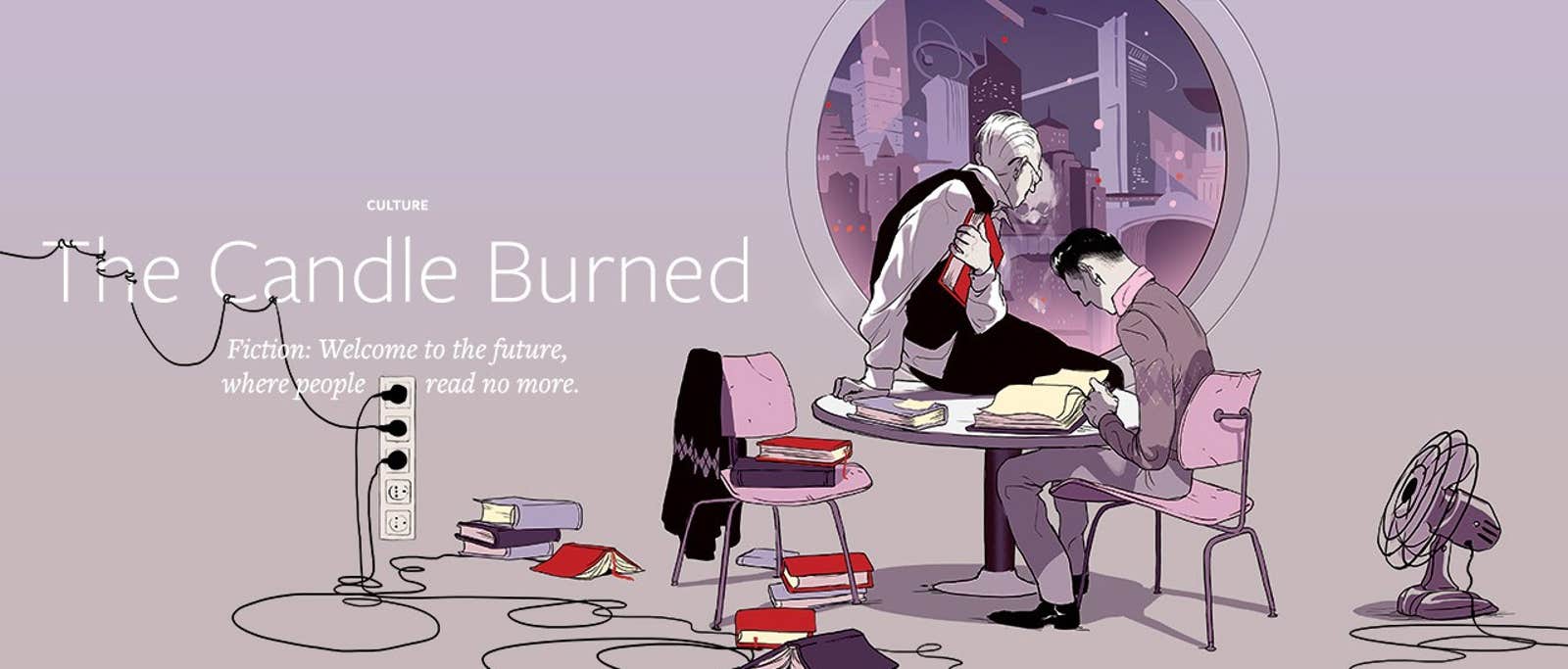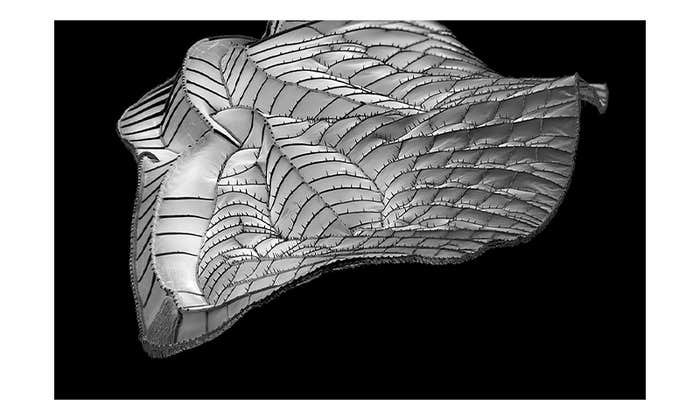Andrey Petrovich had given up all hope when the videophone rang.
“Hello, I saw your ad. You give private literature lessons?”
Andrey Petrovich peered at the man on the screen. He was about thirty, with an open smile and serious eyes, dressed in a suit and tie. Andrey Petrovich’s heart skipped a beat. Posting the ad on the Net had become but a hapless habit. In the past ten years he had received six responses. Three callers had dialed the wrong number, two others were old-fashioned insurance salesmen who still made phone calls, and the last one had confused literature with legislature.
“Y-yes, I d-do,” Andrey Petrovich stuttered anxiously. “In my apartment. You are interested in literature?”
“I am,” the man nodded from the screen, and introduced himself. “My name is Maksim. How much do you charge?”
Andrey Petrovich almost blurted, “it’s free,” but caught himself. “Rates are per hour. And negotiable.” He took a deep breath. “When would you like to start?”
“Well, I… you see,” Maksim started.
“First lesson is free,” Andrey Petrovich said quickly. “If you don’t like it, there’s no obligation.”
“Let’s start tomorrow then,” Maksim said definitively. “Are you free at ten in the morning? I drop the kids off at school by nine, and then I’m good until two.”
“I’m free,” Andrey Petrovich said happily. “Here’s my address. Got a pen?”
“I’ll remember it,” Maksim assured him. “Go ahead.”
Andrey Petrovich couldn’t sleep that night. Pacing from wall to wall in his tiny room, nearly a closet, he tried to tame his shaking hands and jumbled thoughts. For the past twelve years, he had been living on a meager subsistence, ever since the day he was fired. He had given up all hope of teaching.
“Your specialty is too narrow,” the principal of The Arts and Humanities Academy for the Gifted and Talented had told him during their last conversation. “You are an excellent pedagogue, but your subject has outlived itself. Children don’t study it anymore. Why don’t you retrain, take on something modern like virtual ethics or robotic torts legal code? Or as a last resort, the history of cinematography. It’s on its way out too, but it would carry you to retirement. The Academy would reimburse you for some of the cost. What do you say?”
Andrey Petrovich declined the offer, which he regretted later. There were no jobs in literature and philology, and former teachers were moving into other disciplines, grasping at any conceivable straws. For the first two years, he diligently went through liberal arts colleges and conservatories, but departments of humanities were disappearing and libraries were closing. When all proved fruitless, he tried to retrain, despite his aversion to the dry modern disciplines. When his wife left, he gave up.
As his savings dwindled, Andrey Petrovich spiraled into poverty. First, he sold his aircar, old yet still in good shape. Then he let go of the antique tea set, his mother’s memento. Furniture and clothes followed. And once he was left with nothing in his sad bachelor pad, it was the books’ turn. The real books—the old-fashioned, leather-bound tomes with original illustrations, still smelling of ink, paper, and glue. Collectors paid top price for the rare old volumes, so Leo Tolstoy brought food to his table for almost a month. Fyodor Dostoevsky lasted for two weeks. Ivan Bunin sufficed for about ten days. Every time Andrey Petrovich thought about his lost treasures, he felt like throwing up.
Literature died because it didn’t fit into the evolutionary progress. But it used to carry the wisdom of mankind to the next generation. It used to nourish souls and build spirits.
Finally, he was left with a few dozen of his absolutely favorite books, which he couldn’t sell even if faced with starving to death. Hemingway, Balzac, Zola, Pasternak and a few other authors huddled together on his four remaining shelves, and every day Andrey Petrovich lovingly dusted them.
“If the lessons work, I may be able to buy back Tolstoy,” he mumbled to himself, shuffling from wall to wall, anxiously waiting for the morning. “Or maybe Murakami. Or should I do Amado first?”
Suddenly, a realization struck him. It didn’t matter whether he could reclaim his books. What mattered was that he could pass on his knowledge of the long forgotten art: the beauty of the language, the flow of the story, the insights of its authors. He could impart, transfer, and transform.
Maksim rang his bell at 10 a.m. sharp.
“Please, have a seat.” Andrey Petrovich ushered him in. “What would you like to start with?”
Maksim awkwardly lowered himself into a chair.
“What do you think I should start with?” he asked—and blushed. “I have to confess, I’m a total ignoramus. No one ever taught me anything. Do you understand what I mean?”
“Oh, but of course I understand!” Andrey Petrovich burst out sympathetically. “No one taught anyone for generations. Literature has been an academic stepchild for more than a hundred years. It’s even been abandoned by schools with a humanitarian focus. It’s no longer offered anywhere.”
“Anywhere?” Maksim echoed.
“I’m pretty sure of it,” Andrey Petrovich replied with a sigh. “See, the crisis began at the end of the twentieth century. People had no time to read. First children had no time to read, then their kids really had no time to read, and so on, every generation worse than the one before. Interactive entertainment pushed out reading. Technology pushed out philology. Literature, history and geography couldn’t compete with cybernetics, quantum mechanics, and plasma physics. But literature was worst of all. It just fell by the wayside. Do you understand?”
Maksim nodded. “Yes, I do. Please continue!”
“In the twenty-first century electronic platforms took hold and publishers stopped printing paper books. Because people no longer read, the number of writers dwindled and eventually they went extinct. Writers stopped writing! The literary reserve built over twenty centuries of writing is still more than sufficient to teach literature, but no one cares anymore. We’re losing our history.”
Andrey Petrovich paused for a few seconds and wiped off his suddenly sweaty forehead.
“It’s so hard to talk about,” he finally uttered. “I understand that it was an inevitable process. Literature died because it didn’t fit into evolutionary progress. But it used to carry the wisdom of mankind to the next generation. It used to nourish souls and build spirits. It helped form the minds of children. Today, our children are raised emotionally and intellectually empty. They grow up soulless like machines. It’s horrible and it’s frightening!”
“That’s what I felt too.” Maksim nodded. “That’s why I came to you.”
“Do you have children?” asked Andrey Petrovich.
“Well…” Maksim stuttered. “Yes, two, a year apart. Pavlik and Anechka. I need the foundation. I’ll find and read the manuscripts on the Net. I just need to know what to read. And how to think about what I read. Will you teach me?”
“Yes,” Andrey Petrovich said, inspired. “I will and I shall.”
He stood up straight and spread his shoulders, suddenly growing taller and stronger as he filled his lungs with air. “Boris Pasternak, poetry,” he announced, fetching the dormant words from his memory.
“As blizzards whirled around the earth
And snow churned
A candle burned upon the table,
A candle burned…”
When the lesson was over, Andrey Petrovich asked, with a slight tremor in his voice, “Will you come tomorrow?”
“I sure will,” Maksim answered with determination. “The only thing is—you know, about the payment. I work as a secretary for a wealthy couple. I manage bookkeeping, I do shopping, I run errands. My salary is kind of low, but I can bring food, clothes, merchandise, and even some electronics—as payment. Would that work for you?”
Andrey Petrovich blushed. He felt so inspired after his first lesson, he would do it for free.
“Of course it works,” he said. “Thank you. I’ll see you tomorrow.”
“Literature is not only about the story, but also about how that story is spoken.” Andrey Petrovich was pacing around the room as he explained to Maksim the art of storytelling.
“The language is a wonderful and wondrous tool, and our talented ancestors had mastered it brilliantly. Just listen to the words, just listen!”
Maksim listened intently. He always looked as if he was trying to absorb and commit to memory every line Andrey Petrovich uttered. He had an almost uncanny ability to focus, and he never seemed tired or overwhelmed.
“Pushkin, ‘Eugene Onegin,’” Andrey Petrovich would announce the next poem, and then recite. When he was done, he would move onto another author. “Lermontov, ‘Demon.’ Vysotsky, ‘Capricious Horses.’ Have I tired you, Maksim?”
Maksim was never tired. He never lost his concentration either.
As weeks and months went by, Andrey Petrovich rejuvenated. He grew youthful and energetic. His life made sense again, it now had purpose and reason. After poetry they moved onto prose and fiction, which were more complex and time-consuming, but by then Maksim had developed into a terrific student with a keen intuition. Originally nearly tone-deaf to the beauty of the language, he warmed up to the rhyme and rhythm, the cadence and the harmony of words. He made leaps of progress every day as Andrey Petrovich ventured into Balzac, Hugo, Hemingway and Nabokov. Together, they went from classics to science fiction and from mysteries to fantasies, traveling through centuries, countries and empires— from Shakespeare to Remarque, from Maupassant to Fitzgerald, and from Mark Twain to Rabelais.
It was just another Wednesday morning when Maksim didn’t come. Andrey Petrovich waited anxiously. By the end of the day he was a nervous wreck. He tried to convince himself that his student had suddenly fallen ill, but his sixth sense told him otherwise. Punctual like a Swiss clock, Maksim wouldn’t miss a session without fair warning. In a year and a half he hadn’t been late once. He would’ve called. As a matter of fact, he would’ve called the night before!
When Maksim didn’t show up the next morning, Andrey Petrovich knew something bad had happened. He found Maksim’s number in his videophone history, poked the callback button, and gasped when he heard the cold metallic response.
“This number has been disconnected.”
The crisis began at the end of the twentieth century. People had no time to read.
The next few days were a blur. Even his favorite books didn’t save Andrey Petrovich from the swiftly resurrected feeling of uselessness, which now gnawed him with newfound strength. He considered calling hospitals and morgues, but didn’t know how to describe the person he sought after. Looking for a fellow named Maksim, thirtyish, sorry, no last name?
When he finally felt so stifled he could no longer breathe inside his chipping walls, Andrey Petrovich staggered outside.
“Hey there, Petrovich,” Nefedov, his neighbor from the floor below, greeted him on the stoop. “Good to see you again. Whatcha hiding for? It wasn’t your fault.”
Andrey Petrovich stared at him in bewilderment. “What wasn’t my fault?”
“Well, that guy of yours, you know.” Nefedov made a cutting move across his throat. “The one who’s been coming to see you all this time. I was wondering cuz it’s not like you to hang out with those types, but I just kept my mouth shut.”
“What types?” Andrey Petrovich asked, still stupefied. “Who are you talking about?”
“Who do you think? Them, the smartass thugs,” Nefedov snorted with distaste. “I can tell ’em a mile away. Spent thirty years training that sort.”
Andrey Petrovich grew cold. “Can you tell me what you’re talking about?” he pleaded desperately. “I don’t get it!”
“You really don’t know anything?” It was Nefedov’s turn to be stunned. “Check out Net News, it’s all over the place!”
Andrey Petrovich stumbled back into the elevator and almost fell into his apartment. He booted his computer up, connected to Net News—and moaned in almost physical pain.
“Caught stealing foodstuff, merchandise and electronic equipment,” the words blurred in front of his eyes. So did Maksim’s picture, but he forced himself to keep reading. “Household Robot-Secretary, enhanced self-learning model, serial number MKS-4355. In his statement, MKS-4355 said he unilaterally resolved that children were growing up soulless and took it upon himself to educate them on literary subjects outside of the established school curriculum, while keeping it secret from his owners. The manufacturer identified a bug in the knowledge control module and issued a recall for the MKS series while liquidating the defective #4355 from the force. The incident caused public outrage and raised questions about the loyalty and honesty of our machines.”
On disobedient legs, Andrey Petrovich staggered into the kitchen and reached for a bottle of cognac Maksim had brought a few weeks ago as yet another payment. He frantically searched for a glass, didn’t find it, and latched onto the bottle in a long gulp. But the alcohol was too strong for his old throat and he doubled over in a wheezing cough. His knees gave way and he sank onto the floor.
“MKS-4355,” he moaned, fighting a sharp pain that suddenly squeezed his heart. “A machine, oh my God, another faceless machine!”
He felt betrayed, cheated, humiliated. He had given this piece of electronic equipment everything he had—his knowledge, his heart, his soul. All this time he thought he was teaching a human being who’d bring the sacred spirit of storytelling back into the world. Instead, he had wasted his time on a preprogrammed whirl of wires. Literature was doomed, and he was doomed with it.
With a sudden determination, Andrey Petrovich pulled himself up and slammed his window shut. Then he stumbled over to the stove to turn on the gas. It would take an hour, max, and then it would be over.
His hand was on the knob when the doorbell rang. Andrey Petrovich moaned, but let go of the stove and staggered to the hallway. At the door stood two kids: a boy of ten and a girl, about a year younger.
“You give literature lessons?” she blurted out, her bright eyes dazzling from under her long bangs.
Andrey Petrovich was rendered speechless. “W-who are you?” he finally managed.
“I am Pavlik,” the boy answered. “And this is Anechka, my sister. Maks sent us.”
Andrey Petrovich gasped. “Who?”
“Maks,” the boy repeated with determination. “He told us to tell you, before they…
before he… before his…”
Anechka stepped forward. “As blizzards whirled around the earth and snow churned…” she began.
“A candle burned upon the table, a candle burned,” Pavlik continued.
Trying to push his pounding heart from his throat back into his chest, Andrey Petrovich swallowed hard. “I can’t believe it,” he whispered. “I can’t believe it.”
“Andrey Petrovich, will you teach us?” asked Pavlik. “Maks said you would.”
Grasping at the coat rack to keep his balance, Andrey Petrovich stepped back into his hallway.
“Come in, children, please,” he whispered. “Come in, children, my dearest.”
A New York writer originally from St. Petersburg, Mike Gelprin has published more than a hundred science fiction and detective stories in Russian periodicals. His book, The Reluctant Nomads, will be released in Moscow this summer. “The Candle Burned” is his first story published in English. He can be reached at mgelprin@yahoo.com.



























